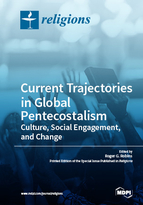Current Trajectories in Global Pentecostalism: Culture, Social Engagement, and Change
A special issue of Religions (ISSN 2077-1444).
Deadline for manuscript submissions: closed (15 July 2018) | Viewed by 80184
Special Issue Editor
Interests: early pentecostalism; the political turn in U.S. pentecostalism
Special Issue Information
Dear Colleagues,
The twenty-first century has witnessed a rich outpouring of scholarship in the once lightly attended field of Pentecostal studies. Today, historians, theologians, and religious studies scholars are joined by colleagues representing cultural studies, critical theory, and the full panoply of the social sciences. As the field has gathered strength and standing, it has also raised awareness. Whereas scholars of Pentecostalism once felt obliged to array a preemptive battery of statistics in defense of their vocation, they now increasingly expect the scale and importance of the movement to be taken more-or-less for granted. Indeed, developments within global Pentecostalism have conspired with the resurgence of religious actors generally to insure that an informed observer, if not the average lay reader, will usually recognize the movement’s relevance to subjects ranging from electoral politics and human security to economic values and the formation of social capital.
Yet, much remains to be done. For one thing, the object of study is a complex, rapidly growing phenomenon marked by hybridity and fracture, glocalization and paradox. Consequently, studies may have a rather short shelf life. Changes shift the ground beneath old assumptions, former preoccupations grow less fitting, new questions arise—either within our disciplines or from developments on the ground—that require even the best studies to be updated and extended. Furthermore, as the volume and quality of scholarship expand, the need to broaden and deepen the dialogue gains urgency. Today, scholars on every inhabited continent are employing an impressive variety of tools to examine structures and textures, collectivities and individuals, pulpit and pew, street corner and statehouse. Drawing these threads together into a sustained interdisciplinary conversation will greatly enhance our portraits of the coterie of entities we house under the name of global Pentecostalism.
This special issue of Religions is devoted to just such a conversation. The title, Current Trajectories in Global Pentecostalism: Culture, Social Engagement, and Change, highlights three intimately related domains of particular interest that we wish to present for interdisciplinary consideration:
- Culture: How are Pentecostals construing or manifesting themselves via rhetoric and discourse, gender and sexual ethics, worship, music, spirituality, theology, pedagogy, architecture, or material culture?
- Social Engagement: Where are the leading points of engagement between Pentecostalism and contemporary societies, and what are the effects of such engagement? How is Pentecostalism enabling (or disabling) the faithful—individually or collectively—in their efforts to engage society and negotiate the realities of daily life in the modern world?
- Change: What are the key dimensions of social or cultural change within Pentecostalism? How is Pentecostalism being transformed as it attempts to transform the world?
The ideal submission will be grounded in primary research, close reading, or case studies, but with a synthetic cast that opens to broader observations concerning global Pentecostalism. Also, we are interested in submissions that focus on the individual as well as those that examine groups and communities. Religions, that is to say, has interest in Pentecostals as well as Pentecostalism.
We are especially keen to solicit submissions from senior scholars whose personal experience can yield a diachronic view of the movement. What are the key recent developments in the areas you have been monitoring? And how has your thinking about the movement changed over the course of your career?
Note of definition: In demarcating the perimeter of our subject, we will show a preference for Pentecostal, Neo-Pentecostal, or Renewalist movements operating largely outside of the traditional Protestant denominations, the Roman Catholic Church, or historic Orthodoxy. (If you wish to appeal with a Charismatic exception, feel free to make your case.) As a rule of thumb, we will consider Pentecostalism to encompass movements that place emphasis on baptism in the Holy Spirit; profess and practice spiritual gifts (including divine healing); endorse (and at least occasionally practice) glossolalia; adopt a “Born Again” view of salvation; and self-ascribe as Christian.
Dr. Roger G. Robins
Guest Editor
Manuscript Submission Information
Manuscripts should be submitted online at www.mdpi.com by registering and logging in to this website. Once you are registered, click here to go to the submission form. Manuscripts can be submitted until the deadline. All papers will be peer-reviewed. Accepted papers will be published continuously in the journal (as soon as accepted) and will be listed together on the special issue website. Research articles, review articles as well as short communications are invited. For planned papers, a title and short abstract (about 100 words) can be sent to the Editorial Office for announcement on this website.
Submitted manuscripts should not have been published previously, nor be under consideration for publication elsewhere (except conference proceedings papers). All manuscripts are thoroughly refereed through a double-blind peer-review process. A guide for authors and other relevant information for submission of manuscripts is available on the Instructions for Authors page. Religions is an international peer-reviewed open access monthly journal published by MDPI.
Please visit the Instructions for Authors page before submitting a manuscript. Submitted papers should be well formatted and use good English. Authors may use MDPI's English editing service prior to publication or during author revisions.
Keywords
- Pentecostalism
- Pentecostal
- Neo-Pentecostal
- Renewal
- Renewalist
- Globalization






